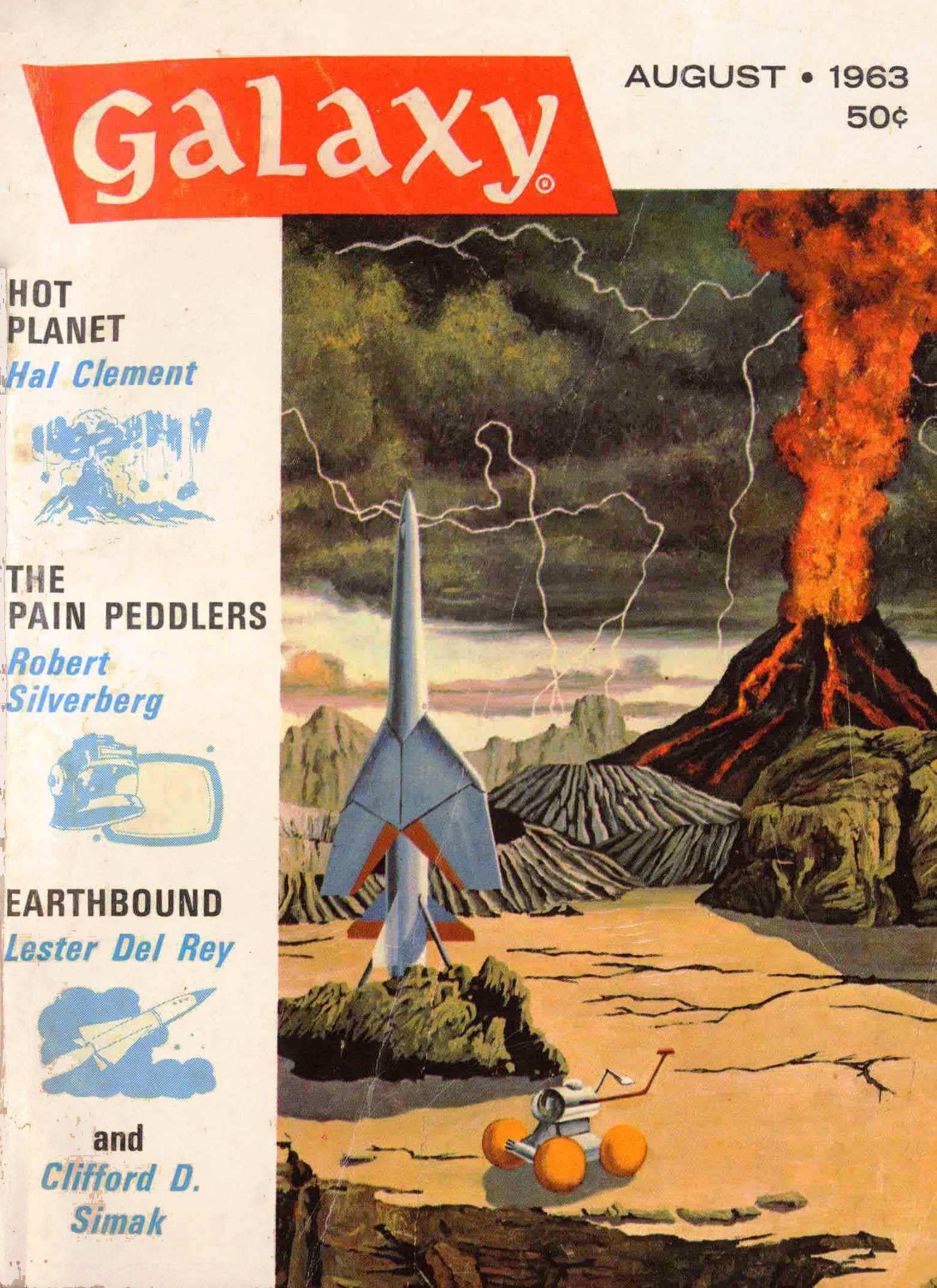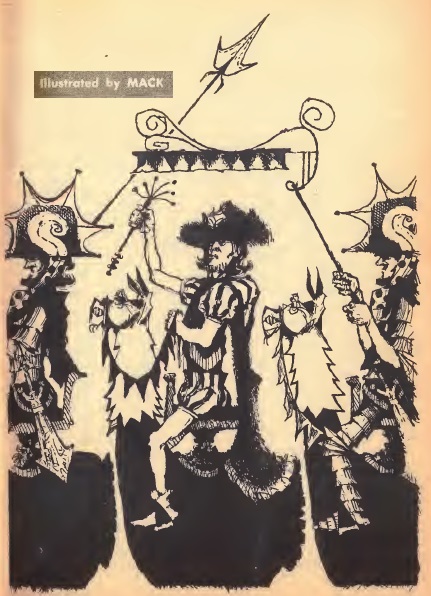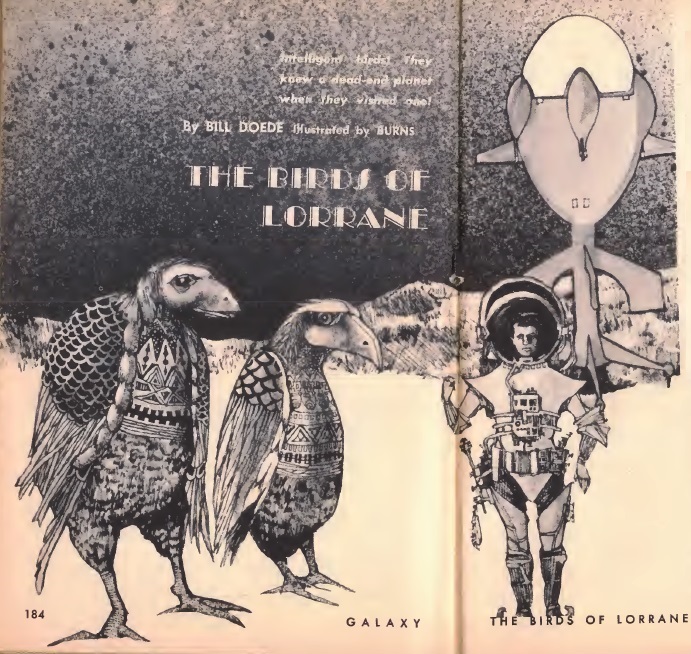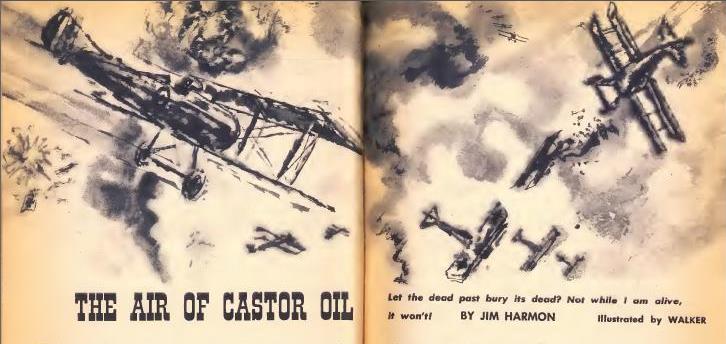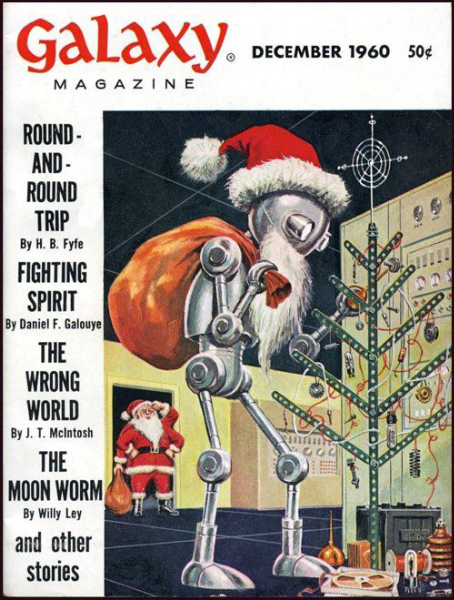
by Victoria Silverwolf

I suppose it's appropriate that a magazine about the future should bear a cover date from a year that hasn't arrived yet. While the rest of us count the days until the end of 1963, editor Frederik Pohl peers into his crystal ball and discovers what 1964 has in store. According to the latest issue of Worlds of Tomorrow, it's a very mixed picture indeed. With so many different kinds of science fiction stories inside its pages, the magazine is something of a Noah's Ark of imaginative literature. Let's go for a ride, shall we?

Lord of the Uffts, by Murray Leinster

This novella, from an author who has written science fiction for more than four decades, takes up half the magazine. It begins with a man having just returned from a deadly planet where he collected precious gems. He celebrates his good luck in the time-honored way of getting roaring drunk. When he wakes up, he finds himself aboard a rickety spaceship bound for parts unknown. It seems that, while in his cups, he agreed to serve as navigator for the man who owns the vessel. He also got into a fight with the police. His new employer hasn't paid his bills, so they both take off in a hurry to escape the authorities.
The master of the spaceship claims to have a plan to win a vast fortune by journeying to a certain planet. Humans from another world settled it long ago. They have since degenerated into a pre-industrial society. Also inhabiting the planet are sentient aliens who look exactly like pigs. The humans hire them for various odd jobs, in exchange for beer. Despite this arrangement, which benefits both species, the pigs have nothing but contempt for the humans, openly insulting them at every opportunity.
The owner of the spaceship violates a serious taboo by offering to do business with the humans. They consider paying a person for goods or services an unforgivable insult. In their eyes, such things are fit only for the pigs. So serious a breach of etiquette is this that they sentence the man to death by hanging. The protagonist faces a similar fate, when he inadvertently offends his host by speaking words of flattery to the pigs. Complications ensue. The hero eventually finds out why the humans have lost their advanced technological skills, possess only shoddy goods, and depend on the pigs for labor. He eventually manipulates both species into a new way of life, and lives happily ever after with the love of his life.
This is a tongue-in-cheek tale of adventure, with touches of comedy and satire. Despite threats to his life, the protagonist never seems to be in any real danger. The explanation for the ways the humans live is predictable, given a strong hint early in the story. Although it provides some amusement, the story goes on too long to sustain its lighthearted tone.
Two stars.
The Provenance of Swift, by Lyle G. Boyd
This is a mock article claiming to provide evidence that Jonathan Swift was a Martian. Readers of Gulliver's Travels will not be surprised to learn that it is based on the odd coincidence that the great satirist wrote about Mars having two moons long before they were discovered. Well aware that this has been pointed out many times before, the author provides other so-called proofs. Incidents in the life of Swift are interpreted in outrageous ways. Even if this is intended as a spoof of misguided scholarship, it's a one-joke parody. If nothing else, the reader learns quite a bit about a gifted writer. (Swift, that is, not Boyd.)
Two stars.
Alpha, Beta, Love…, by Bill Doede

A man and a woman land on a planet in order to find out if it is suitable for colonization. It is inhabited by two disembodied beings in the form of glowing spheres, able to teleport at will, and to manipulate the minds and bodies of the humans. One of the globes, who used to be male, is more-or-less friendly. The other, who once inhabited a female body, is so resentful of never having had a love life that she attempts to kill the humans. The human man figures out a way to block the aliens' telepathic powers through a technological trick which is not very convincing.
They next encounter a furry humanoid creature with sticky pads on its digits, like those of a gecko. This meeting turns out to have more to do with the spheres than expected. Other strange things happen, but what is really at stake is whether the woman will fall in love with the man or not.
This is an odd story. The author has an active imagination, but the plot never hangs together.
Two stars.
When the Stars Answer, by T. K. Brown III
This tale of first contact begins with a history of radio astronomy, leading up to Project Ozma. The fictional part begins when a spaceship arrives from the star 61 Cygni, in response to signals from Earth. The sole passenger appears human, but has vastly superior intelligence. There's a clever twist in the plot that should have ended the story. Unfortunately, one final paragraph turns the whole thing into a silly farce.
Two stars.
A Message from Loki, by James Blish
A writer better known for fiction offers an article about Jupiter's Great Red Spot. Based on the behavior of high winds on the surface of the Earth, he suggests that it might lie above a gigantic plateau. Since we don't even know if Jupiter has a solid surface at all, this is highly speculative.
Two stars.
The Transcendent Tigers, by R. A. Lafferty

A seven-year-old girl receives a red cap, along with other small gifts, on her birthday. This gives her the power to do incredible things, from turning a hollow ball inside out without tearing it to solving an impossible wire puzzle. Disaster soon follows. Very few writers can pull off this strange kind of apocalyptic whimsy as well as Lafferty. His use of unusual names, bizarre words, deadpan dialogue and narration, and quotes from fictional journals makes this tale of worldwide catastrophe charming.
Four stars.
Little Dog Gone, by Robert F. Young

The magazine ends almost the same way it began, with a man waking up from a drunken spree to find himself far off in space. In this case, the fellow is an actor, who destroyed his career with his drinking. He winds up on a frontier colony planet. The first creature he meets looks very much like an ordinary dog, but has the power to teleport. The friendly little animal accompanies him into town. There he meets a woman who used to play a sort of female Tarzan on interplanetary television. Down on her luck, she now works at the local bar. Together the three form a space-going medicine show, making use of the dog's ability. Success leads the man to confront his past, and to make a decision about his future. Readers familiar with the author's works will not be surprised to learn that this is a sentimental love story. Nevertheless, although it wears its heart on its sleeve, it never becomes overly emotional.
Four stars.
Summing up
From pigs to tigers to dogs, this issue provides a menagerie of science fiction. Although not all the specimens on display are equally interesting, it's worth walking by their cages to see what weird creatures are looking back at you.


![[December 17, 1963] The Ink-and-Paper Zoo (February 1964 <i>Worlds of Tomorrow</i>)](https://galacticjourney.org/wp-content/uploads/2018/12/6312017cover-672x372.jpg)



